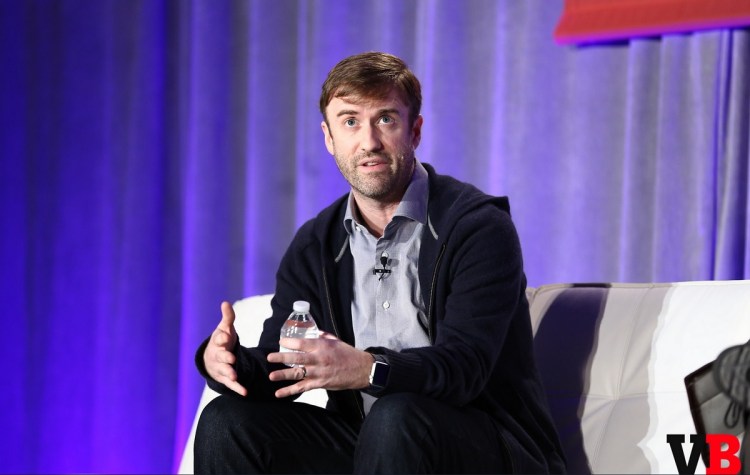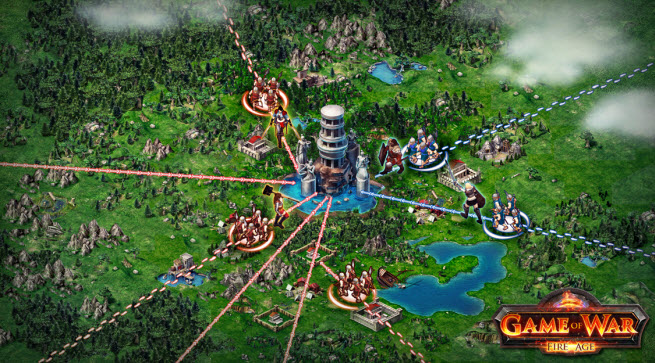GamesBeat: How important was the advertising, like Kate Upton or Mariah Carey? Why did it make sense to do that?
Leydon: I’m a big fan of Asian free-to-play. If you look at Chinese free-to-play, Japanese free-to-play, there’s lots of celebrities involved in marketing those games. Working with Kate, we were focusing on American football, so we worked with someone who was a Sports Illustrated cover model. Somebody who watched football would probably know who she is. We already had a character in the game who looks like her, so we could do it without everyone thinking we were just going for a hit on the American football audience.
We didn’t honestly know how any of it would go. Clash of Clans started about eight months prior, but we were kind of taking it to a different level. TV is interesting. It’s hard to get it right, but if you get it right, it can work. It takes an orchestrated effort across television and digital. You can’t just do TV. You have to do really well on the digital side in order to make it work. But there are definitely pockets where you can spend and have it work out for you.
GamesBeat: You get all of this free advertising on YouTube as well.
Leydon: Machine Zone’s been big in the digital ad space for a while. I don’t think anybody knew, even when we were blasting out ads—I don’t know if the general public knew what Game of War was. But as soon as you go on TV, people think it’s a brand. It’s weird. Even though digital is way, way bigger than television. There’s just something that happens as soon as you go on TV.
GamesBeat: From some of the people looking at you from the outside in, there’s a feeling that you’re overly dependent on one game, that this can’t last. What can you convey from the inside out that shows you’re putting a lot of thought into your strategy?
Leydon: It depends on the observer, but I would say, looking at other video game companies, that I don’t think the multi-title strategy is going to last. That was our bet in 2011. The market is too competitive. The process of creating an app, running an app, and marketing an app is too complicated to do for five games a year. Especially if you want to grow a game to a very large scale. I don’t think it’s possible to do five games a year. I’m not even sure it’s possible to do two.
It may look weird, but you can hear everybody’s statements about what they’re doing. They’re collapsing the number of games they’re making. Right now they’re saying, “Oh, we’re only going to make four or five a year,” but I would guess that in two years they’re all going to be making one.
GamesBeat: If you look at your 550 people, that makes you bigger than Supercell, smaller than King, and smaller than Zynga. What do you choose to do with the teams that you have, now that you have this great engine of profit?
Leydon: Most of it is all in R&D and infrastructure. There’s so much to do. We’re adding hundreds of thousands of man-hours. The customer service requirements are crazy. We’re way behind. We just announced that we’re opening this facility in Las Vegas and we’re hiring about 200 people out there, just for customer service.
It’s incredibly complex in every way. If you want to market at the level we market at, you need well over 100 people just to manage the 300 or 400 ad networks out there in the world. If you want to run television globally it’s a gigantic effort. If you want to keep adding features it’s a huge effort. The QA across 3,000 devices is a gigantic effort.
I see it as our responsibility to build out infrastructure and be able to create the company that can support mobile at scale. Mobile at scale is huge. It’s terribly complex. There are basically no tools for it. There’s no engine you can get. There’s a whole bunch of third-party services that can do one little piece, but none of them are particularly good, because they’re not made by people who actually do this stuff. They’re made by outsiders who think they know what we need to do, but they typically don’t. There’s a tremendous amount of tools and management and infrastructure overall that we need to build.
Supporting a mobile game is a way bigger effort than the industry gives us credit for, I think. Managing it all is incredibly hard.
GamesBeat: What do you think the game industry is going to be like in 2017?
Leydon: 2017 will be, on the distribution side, probably three to five times harder than it is now. People complain about how difficult it is today. People in 2017 will look back and say we had it easy.
The complexity of running a game across all devices and all territories will go up. The requirements for a company to be able to execute on that in a high-quality manner will go up accordingly. I can see successful global game companies growing into the range of thousands of people.
Where I aim to position the company—There’s a lot of tools and technology and processes that don’t exist for free-to-play at the moment. We need to create them and stay ahead of the curve. Niccolo sees distribution problems and solves them with stars, which is totally viable. I see it as a technology problem that there currently isn’t a solution for. That’s what we’re dedicating our R&D toward.
VentureBeat's mission is to be a digital town square for technical decision-makers to gain knowledge about transformative enterprise technology and transact. Learn More




